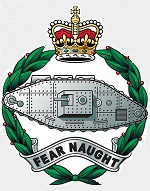Dragon DRR63239 British Sherman Firefly Mk. Vc Medium Tank - "Red 12", 3 Troop, A Squadron, Northamptonshire Yeomanry, France, 1944 (1:72 Scale)
"The only way you can win a war is to attack and keep on attacking, and after you have done that, keep attacking some more."
- General George S. Patton Jr., January 1945
 The Sherman Firefly was a medium tank used by the United Kingdom and some armoured formations of other Allies in the Second World War. It was based on the US M4 Sherman but was fitted with the more powerful British 76.2 mm (3.00 in) calibre 17-pounder anti-tank gun as its main weapon. Conceived as a stopgap until future British tank designs came into service, the Sherman Firefly became the most common vehicle mounting the 17-pounder in the war.
The Sherman Firefly was a medium tank used by the United Kingdom and some armoured formations of other Allies in the Second World War. It was based on the US M4 Sherman but was fitted with the more powerful British 76.2 mm (3.00 in) calibre 17-pounder anti-tank gun as its main weapon. Conceived as a stopgap until future British tank designs came into service, the Sherman Firefly became the most common vehicle mounting the 17-pounder in the war.
The British Army made extensive use of Sherman tanks, but they expected to have their own tank models developed soon, so the idea of mounting the 17-pounder in the Sherman was initially rejected. However, through the efforts of two persistent British officers, government reluctance was eventually overcome, and the Firefly went into production. This proved fortunate, as the Cruiser Mk VIII Challenger and Cruiser Mk VIII Cromwell tank designs experienced difficulties and delays.
After the problem of getting such a large gun to fit in the Sherman's turret was solved, the Firefly was put into production in early 1944, in time to equip the 21st Army Group, commanded by General Bernard Montgomery, for the Normandy landings. It soon became highly valued, as its gun could almost always penetrate the armour of the Panther and Tiger tanks it faced in Normandy, something no other British or US tank could reliably do. Because the Firefly's barrel was visibly longer than that of a normal 75 mm Sherman, crews tried to countershade camouflage it so the tank would look like a regular Sherman from a distance. Between 2,100 and 2,200 were manufactured before production ended in 1945, it is unknown if this includes 100 tanks built for the United States.
Pictured here is a 1:72 Firefly Mk. Vc tank that was attached to 3 Troop, A Squadron, Northamptonshire Yeomanry, then deployed to France during 1944.
Now in stock!
Dimensions:
Length: 3-1/4-inches
Width: 1-1/2-inches
Release Date: June 2024
Historical Account: "Yeomanry" - The Northamptonshire Yeomanry was a Yeomanry regiment of the British Army, formed in 1794 as volunteer cavalry. It served in the Second Boer War, the First World War and the Second World War before being reduced to squadron level in 1956. It ceased to have a separate existence in 1971.
In 1944, as a part of the 33rd Armoured Brigade, the unit participated in the Invasion of Normandy, landing on Gold Beach in Normandy on June 6th. The brigade also included the 1st East Riding of Yorkshire Yeomanry and the 144 Regiment RAC. The Brigade's role was infantry support, therefore it rarely fought as an entity. One of the occasions when the Brigade did undertake an operation on its own was at Le Mesnil-Patry, Rots on June 11th, 1944. Further battles they were involved in were around Caen, including Operation Charnwood on July 7th, the battle to capture Caen. On July 16th, 1944, it was involved in Operation Pomegranate, where it come under the command of the 59th (Staffordshire) Infantry Division.
On August 8th, 1944, it was involved in Operation Totalize, a breakout from the Caen Salient. It was during Operation Totalize that Joe Ekins, a Sherman Tank gunner of the Northamptonshire Yeomanry, gained recognition for being the man who possibly killed the renowned German tank commander, Michael Wittmann, the 4th top scoring tank ace in history, near Saint-Aignan-de-Cramesnil, France. The regiment was briefly attached to the 51st (Highland) Infantry Division for the actions around the Battle of the Bulge. The regiment was re-formed and re-equipped with LVT 4 Buffalo amphibious armoured fighting vehicles for the Operation Plunder the Rhine crossing and was placed under the command of the 79th Armoured Division.






![US Army Dodge WC 63 6x6 1-1/2 Ton Truck - Unidentified Unit, European Theatre of Operations, 1945 [D-Day Commemorative Packaging] (1:32 Scale)](http://cdn4.volusion.store/qh9e9-jdqv9/v/vspfiles/photos/UNI81012-1.jpg?v-cache=1740197136)

![USAAF North American P-51D Mustang Fighter - "Detroit Miss," Ft. Lieutenant Urban Drew, 361st Fighter Group, France, 1944 [Signature Edition] (1:48 Scale)](http://cdn4.volusion.store/qh9e9-jdqv9/v/vspfiles/photos/HA7715A-1.jpg?v-cache=1740197136)
